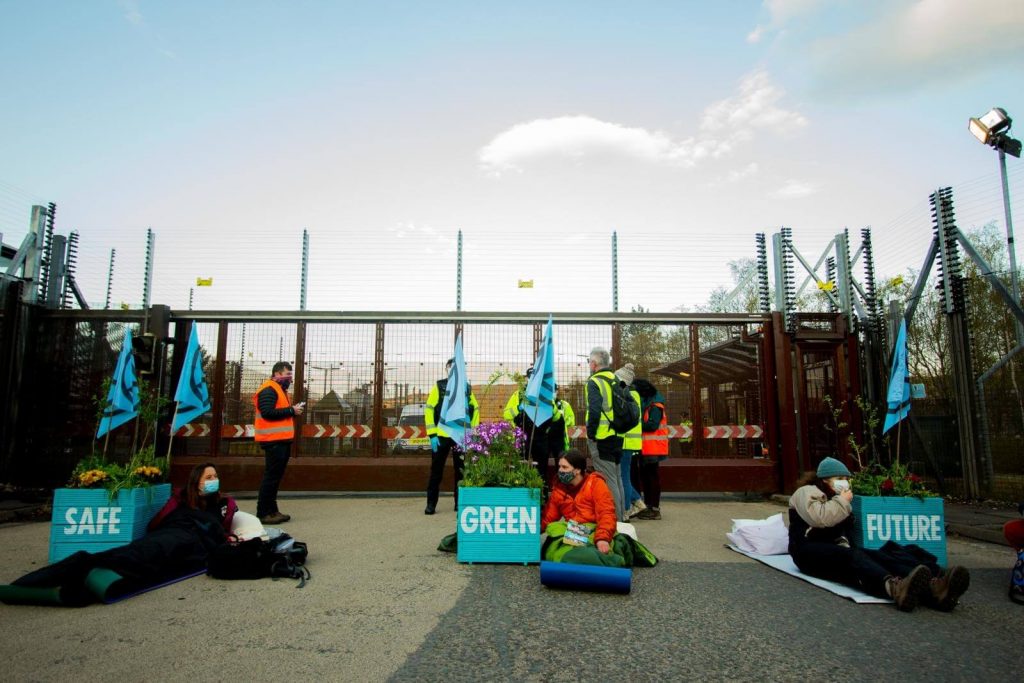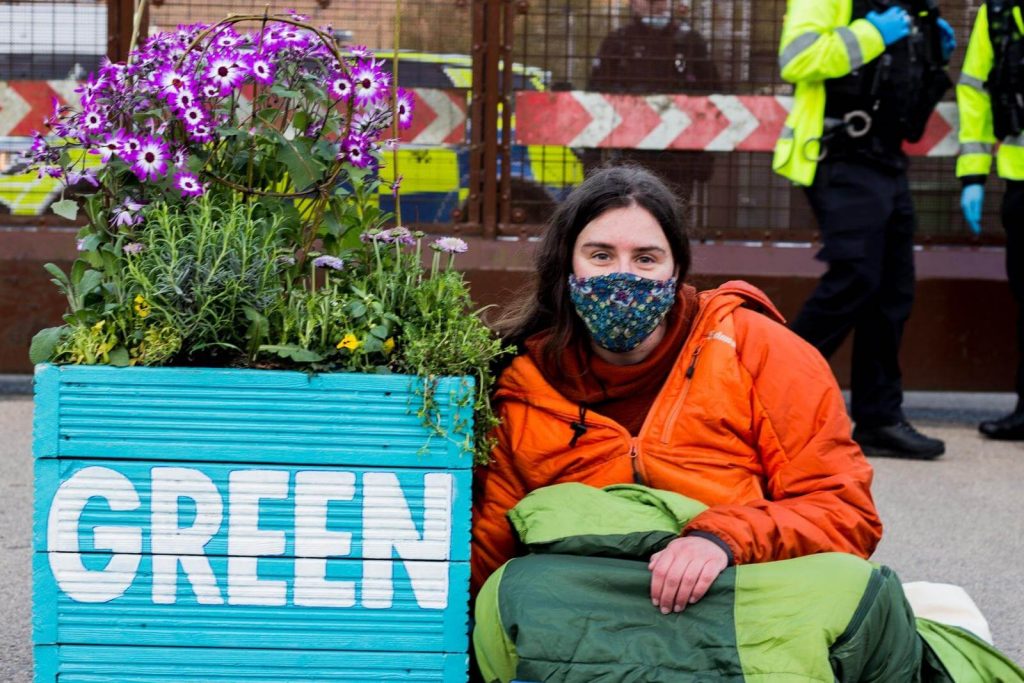Extinction Rebellion blockade Faslane Nuclear Base
May 01, 2021
An all female group of XR Scotland rebels have blocked Faslane’s North Gate to demand a ‘Safe, Green Future’, as part of the International Peace Lotus Campaign.

Climate activists from Extinction Rebellion Scotland, alongside veteran peace activists Trident Ploughshares, have blocked the North gate of the Faslane Naval Base in Gare Loch near Helensburgh home of the UK’s nuclear submarines.
The group have placed three planters on the road containing plants and flowers painted with the words ‘Safe’, ‘Green’, and ‘Future’. A female Extinction Rebel is locked onto each planter so that they cannot be moved, preventing access to the base.
Meg, biologist and XR Scotland activist, said: “We need to build a just, sustainable future, collectively with the whole world, rather than the UK lavishing hundreds of millions on its personal pile of nukes while the climate crisis and social injustice destroy the planet around us.”
The activists demand a future safe from the threat of nuclear weapons and environmental destruction. The Trident nuclear base is polluting the Clyde with toxic chemicals. [1] The cost of updating and maintaining Trident during the systems’ 40 year lifespan is estimated to be up to £205 Billion of public money [2].
The ratification of the United Nations Treaty on the Prohibition of Nuclear Weapons (TPNW) means that nuclear weapons are now illegal under International law. [3]
Sarah, 28, archaeologist and XR Scotland activist, said: “Nuclear weapons are an existential threat to the entire world. Stockpiling weapons with the ability to wipe out all life in order to appear tough does nothing to keep either the uk or any other country safe. The ongoing environmental degradation caused by uranium mining and nuclear testing continues to be felt, particularly among pacific island nations that are also the most threatened by climate change. We must come together to build a safe, more just future for all.”
The action is part of the Peace Lotus campaign, a global day of anti-war resistance coordinated celebrating the anniversary of the end of the Vietnam war. [4]
Citations
[1] Trident nuclear base damned as ‘poor’ after polluting the Clyde
[2] Nuclear Information Service TROUBLE AHEAD RISKS AND RISING COSTS IN THE UK NUCLEAR WEAPONS PROGRAMME https://www.nuclearinfo.org/wp-content/uploads/2020/09/Trouble-Ahead-low-resolution-version.pdf
[3] International Campaign Against Nuclear Weapons The treaty
[4] Peace Lotus Day of Anti-War Resistance
Sign-up for our updates
Keep in touch with our latest news and how you can get involved. We’ll even suggest some great reads and podcasts about activism. You can unsubscribe at any time.

Further reading
Always Immoral Now Illegal: Nukes have been banned
On the 22nd of January 2021 the United Nations Treaty on the Prohibition of Nuclear Weapons (TPNW) came into force. It is the first legally binding international agreement to comprehensively prohibit nuclear weapons.
The TPNW prohibits member states from developing, testing, producing, manufacturing, transferring, possessing, stockpiling, using or threatening to use nuclear weapons, or from allowing nuclear weapons to be stationed on their territory. This includes acting to assist or encourage others in any of these activities.
- The Treaty on the Prohibition of Nuclear Weapons (TPNW) bans states signed into the treaty entered into force on the 22nd January 2021. Member states of the treaty are banned from developing, testing, producing, manufacturing, transferring, possessing, stockpiling, using or threatening to use nuclear weapons, or allowing nuclear weapons to be stationed on their territory [3].
- No nuclear state was a signatory of the TPNW. The rest of the world is calling for the end of nuclear weapons. Of the 51 countries that have ratified the treaty 48 are in the Global South. This includes Thailand, Vietnam, Malawi and Ghana [3]
- These are the countries that are most affected by climate & ecological breakdown.
- Western culture and global North countries are more responsible for eco breakdown, and horde the world’s arsenal of nuclear weapons as part of the military domination that uphold the unfair distribution of the world’s resources.
- We have a duty as a heavily polluting country with a lot of weath to make reparations for colonisation and the damage caused by industrialisation.
Peace Lotus Day of Anti-War Resistance
- This action is part of the international Peace Lotus campaign highlighting the devastating human and environmental costs of military action across the globe and celebrating the successes of international anti-war solidarity throughout history.
- Groups taking part:
- Trident Ploughshares, Scotland
- Visha Safari Moksha, India
- Grassroots Women’s Internationalist Solidarity Action Network, India
- Planet Repairs Youth Positive Action Campaign, Ghana
- Grassroots South-North Internationalist Forum, Ghana
- XR Affinity Network of Asia (XRANA)
- XR Affinity All- Afrikan Network
- XR International Support Network XRISN
30 April marks the end of the Vietnam war in 1975
- This day was remarkable in world history because of the vast solidarity struggle that had fought to end the war. The struggle saw campaigners in the global south and north come together, all of humanity, to end the war. This is what we need to combat the climate and ecological crisis
- The Vietnam War saw great environmental destruction which leaves ecological damage still evident today. (Article: US firms behind Agent Orange stand trial in France)
- Find out more on Peace Lotus Internationalist Solidarity Day of Anti-war Resistance
Climate change causes war. War creates climate change.
- MOD admit climate breakdown will increase global conflicts. Climate change is a “threat multiplier” that makes already dangerous social and political situations even worse.
- For example India/ Pakistan are both vulnerable to extreme Monsoon rains and heatwaves, events that are certain to get worse due to CEE. Likely to lead to increased tensions.
- Western military defend fossil fuel / extractivist economy by intervening in oil/resource-rich nations. See for example the 1990 Gulf War and 2003 invasion of Iraq.
- Countries currently experiencing active war and armed tensions, many of these conflicts are due to fossil fuel extraction:
- Ethiopia
- Yemen
- Columbia
- India (farmer protest)
- Ghana
- Nigeria
- Angola
- Mozambique
- The deployment of heavy military equipment used to fight war changes the environment and landscape.
- Ecocidal impacts of war; occupation of the country, division of people, air pollution from bomb damage, deforestation, extinction of species, contamination of land and water resources, chemical weapons poisoning, radiation affects whole continents.
Demands
XR Peace demands that the government work to reduce international tensions, avoid war as a method of resolving conflict, eliminate nuclear weapons, dramatically reduce military spending and redirect resources currently in the MOD budget to address the threat of climate catastrophe that now faces all peoples of the earth.
References
[1] Trident nuclear base damned as ‘poor’ after polluting the Clyde
[2] Nuclear Information Service TROUBLE AHEAD RISKS AND RISING COSTS IN THE UK NUCLEAR WEAPONS PROGRAMME
[3] International Campaign Against Nuclear Weapons The treaty
Nuclear Weapons and climate change
10 ways that the climate crisis and militarism are intertwined
Affects of uranium mining – https://www.latimes.com/news/la-na-navajo19nov19-story.html
Links for further info
- Justice for Tran To Nga
- Warwick University Anti Vietnam War Movement archive
- Margaret Stanton film
- Young People vs the Government – launched in December 2020 – 3 young people along with the Stop the Maangamizi Campaign take the government to court for failing to protect their futures. (Links: https://planb.earth/, Stop the Maangamizi Campaign – Young People v UK Gov)
